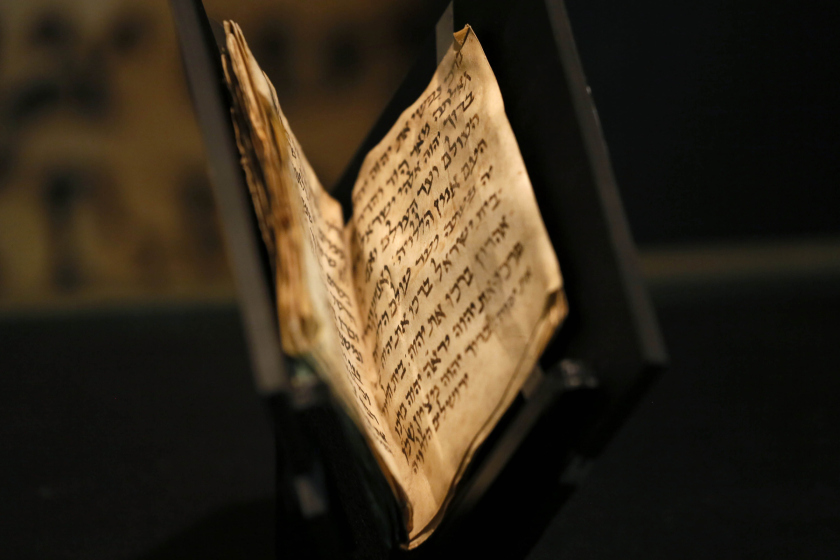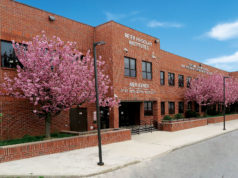
IMAGINE BEING AWAY FROM HOME ON A BUSINESS TRIP IN HONG KONG, A LARGE BUSTLING ASIAN CITY. YOU ARE ALONE WITH FEW FOOD OPTIONS, NO FRIENDS, NO ONE TO PRAY WITH AND A PARTIAL SUITCASE FULL OF CANNED SOUP AND CRACKERS. THERE IS NO KOSHER FOOD AND CERTAINLY NO KOSHER FOOD FOR SHABBAT. AROUND YOU ARE THOUSANDS OF CHINESE PEOPLE.
The earliest Syrian travelers—the Seven Orient Originals—were Albert (Bero) Chehebar, Manny Haber, Alfred Sutton A”H, Ralph Harary A”H, Jack E. Mamiye, Joseph M. Sutton (Joe “Camera”), Ralph S. Tawil A”H and Saul H. Tawil. These men had to make grave sacrifices while overseas to make a living for their families, all the while keeping with tradition and religion. They did their best.
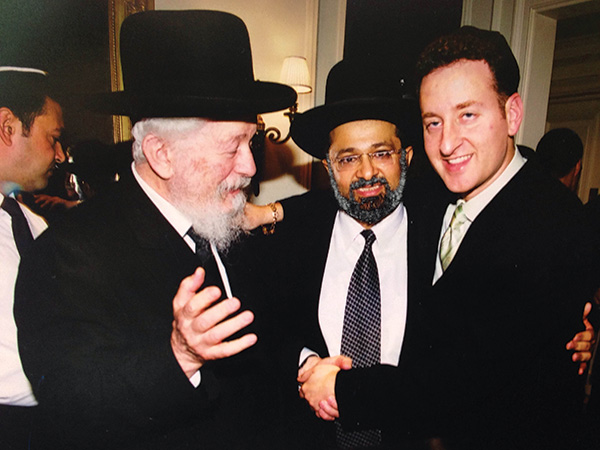
A famous story highlights just one small sacrifice that they had to deal with. Sunset was nearing on a Friday night, and they realized they didn’t have any more kosher grape juice. There was no supermarket that they could just run to to buy it. There were no Jewish people who they could ask for grape juice. Instead, they quickly ran to a local supermarket, bought grapes and squeezed them into a cup, so they had wine, so to speak, for Friday night kiddush.
“When you’re in the shul you aren’t far from home, you are home!” said Joseph Sutton, one of the originals. “It’s amazing how the shul, the rabbi and staff can service 350 people for minyan, Shabbat dinner, lunch, classes and Seuda Shelesheet, and do it in an organized manner with warmth and friendship—I saw it with my own eyes−super.”
Hong Kong has two sides—Hong Kong island and the Kowloon side. Hong Kong island had a synagogue built by the Sassoon family in 1901. The Kowloon side is mostly for transient business travelers and could not accommodate the needs of the passerby, let alone a Jewish community.
In the mid-90’s, while still in his early years of placing rabbis, Rabbi Sam Kassin of Shehebar Sephardic Center got a call from Eddie Sitt and Jack Mamiye. “Rabbi, we have an office in Kowloon, and we want a rabbi here, and we will give him space in our office to set up a mini shul for minyanim and Torah learning.” Rabbi Kassin knew Rabbi Netanel Meoded, who had studied in Hebron Yeshiva, was looking for an opportunity abroad.
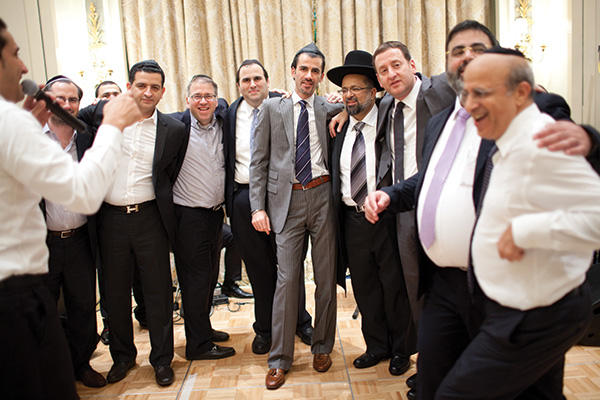
Born in Jerusalem to Yemenite immigrants, Rabbi Meoded’s grandfather was Av Beit Din in Yemen. He learned in the Hebron Yeshiva and was one of the star students. He was close to many prominent rabbis including Maran the Rishon LeZion Rabeinu Ovadia Yosef zt’l, who called him Talmidi v’Havivi.
“The shul started in my office with the help of Eddie Sitt,” said Jack E. Mamiye. “It grew with the help of Rabbi Sammy Kassin, Rabbi Meoded and his wife. Finding the right person is only with the blessing of Hashem.”
Immediately, Rabbi Kassin and Rabbi Meodod went to Hong Kong with the hope of bringing the light of Torah and daily minyanim to the Far East. The men set them up to use part of their office as the synagogue and the rabbi’s residence. It was small and basic , yet fine for starting out. The synagogue had been prepared, they brought a Sefer Torah, prayer books and other essentials to have a shul.
Rabbi Meoded went to the local hotels, looking for business men, backpackers and even Jewish residents to try to form minyanim. He would go to the reception and ask if there was a Mr. Sutton or Mr. Cohen and keep on saying popular Jewish names until he would round up the people needed. His wife, Rebbetzin Yael, always prepared a wonderful meal from her own kitchen for the guests.
As a young businessman, Joey Habert was in Hong Kong and saw a rabbi putting up mezuzot in one of the local offices. It was such a strange sight, a rabbi in Hong Kong. Joey had little food left and was wondering what he would do for Shabbat. He thought the rabbi must be having a Shabbat meal somewhere, so he approached Rabbi Meoded and was invited for Shabbat and minyan. Joey accepted and brought a few friends who were also there that weekend. The minyan and Friday night dinner were was like manna from heaven! It was the best meal they had in weeks. That was the very beginning of a long journey ahead between Joey and Rabbi Meoded to build what we know today as Kehilat Zion/Hechal Ezra—our home away from home.
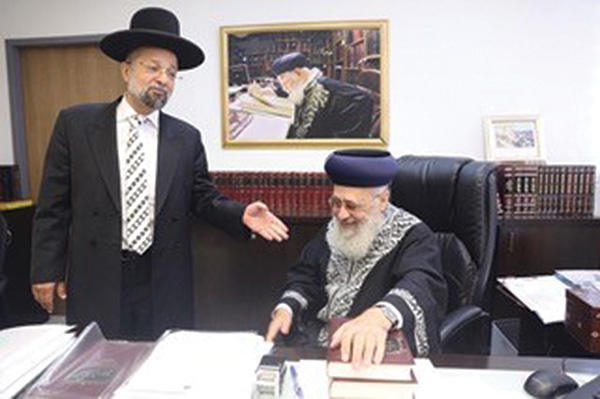
Every week, Rabbi Meoded continued going to the hotels, asking for people by Jewish names, and inviting them to come for Shabbat and prayers. In addition to businessmen, the rabbi was able to pull in non-religious people and have them join for prayers and meals.
Eventually, many of them returned to Judaism. Word spread and soon more and more people were coming for meals and services. When Joey returned a few months later there were more people squeezed into the small space. It was clear that Rabbi Meoded and his wife had outgrown the space. The Rebbetzin expressed to us that the kitchen was too small to accommodate serving the crowds properly. Joey and the businessmen with him immediately raised $5,000 for a new kitchen, one that would enable proper cooking to visiting businessmen and tourists.
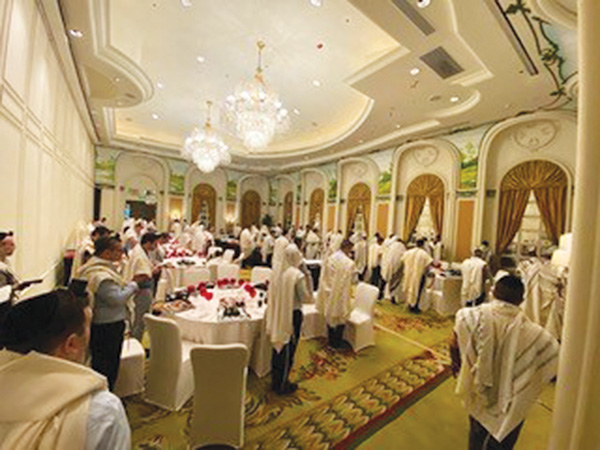
Twenty-seven years later, Joey Habert is still raising money for the synagogue, known as Kehilat Zion of Kowloon, now called Hechel Ezra. The name Hechal Ezra came about when Max Abadi a businessman and resident of Hong Kong approached the Rabbi and wanted to name the synagogue in memory of his father Ezra z’l.
Since then, the synagogue has expanded twice, and now also has a restaurant to serve the Jewish community and travelers. During the enormous exhibitions and fairs held in China, as many as 300 people attend and are served three delicious hot Shabbat meals. There are businessmen, backpackers and tourists who all seek a good Sephardic meal. For the past 15 years, Kehilat Zion/Hechal Ezra has rented part of the Ritz Carlton Hotel in Guangzhou, established a synagogue and kosher l’mehadrin restaurant for the businessmen. Rabbis, rosh yeshivas and important public figures including the President of Israel, and members of the Knesset have attended.
The synagogue has a kollel of 3-5 young men who are stationed there for months at a time to learn and also help make the minyanim. The shul also boasts one of the biggest and most in depth libraries of Hebrew books in all of Asia. The Far East Shehebar Sephardic Torah Center was donated by the Chehebar family, known for their support of Torah and hesed, in memory of their father Gabriel Shehebar z’l.
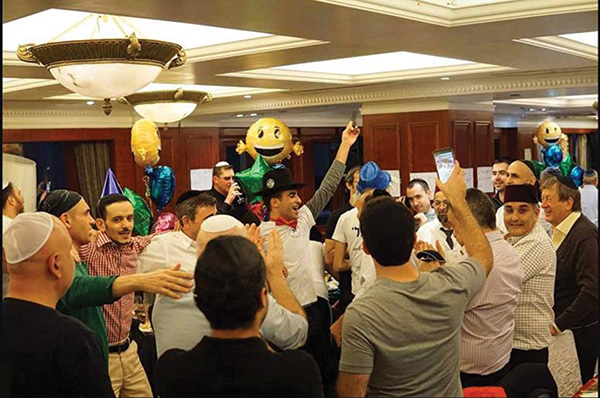
Syrian and Sephardic Jews who travel to Hong Kong from all over the world and visit Kehilat Zion/Hechal Ezra feel like they are in a synagogue in Brooklyn’s Syrian community because of the atmosphere, the food, and the strong adherence to Sephardic minhag. There you can meet Sephardim from Brazil, Argentina, Panama, Mexico, France, Israel and many more places. The Beit Knesset is truly a home away from home to more than 5,000 Jews a year, visiting from all over the world. Being a part of it is an amazing experience!
Due to the corona pandemic and the halt of travel to Hong Kong and China, the synagogue is coping with a lack of overseas visitors and a huge financial crisis. However, the synagogue made due and sought out 30 members of the local community to come make the Minyanim and Shabbat services.
In addition to making sure all the spirituality is upheld for the community, Rabbi Meoded has many other responsibilities, which include assuring his workers are in compliance with government regulations, bringing in kosher food, and supervising it to supply kosher food to the community and travelers, organizing special meals, as well accommodating tourists and the businessmen who attend the multiple exhibitions in China. The local Chinese call Rabbi Meoded “Mister Rabbi.”
“When you are in China all week, you are not eating right, you’re all alone and you are working long hard hours, you look so forward to that meal and warm companionship,” said Joey Habert. “There are so many food challenges and you can pack just so much instant soup. When we get to the shul five minutes before candle-lighting, we smell the hallah, we see the rabbi and our fellow Jews from all over the world. It is truly a heavenly experience to walk into. The shul has an excellent chef who prepares familiar foods, as well as some local delicacies. They serve us a seven-course meal on real plates (not paper), with silverware. There is singing, socializing, Divrei Torah and catching up with people. We all pray the same tefillah, no matter where we are from. It is truly special.”
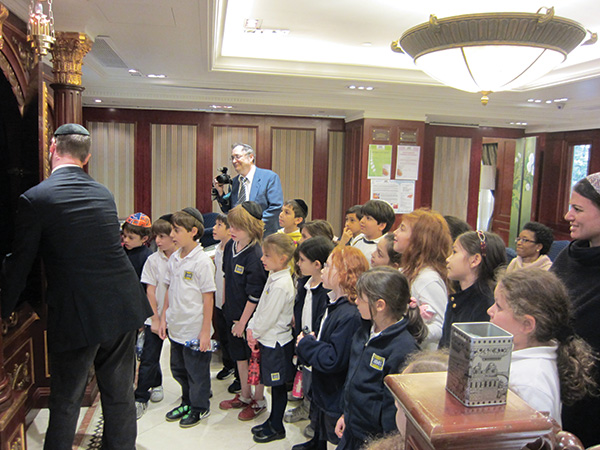
On Shabbat, visitors are among a spectacular mosaic of people from all over the world—Syrian businessmen alongside backpackers, Hasidim, Modern Orthodox and others, sitting together in wonderful unity. The concept of Klal Yisrael takes on a different meaning and special spiritual feeling during these joyful Shabbats.
After a week of working, praying, having a minyan and sitting for a Shabbat meal at Kehilat Zion, with Rabbi Meoded and his wife, along with people from all over the world, is very comforting. Visitors feel at home.
In 2002, the Raymond and Albert Habert families donated a Sefer Torah to the synagogue and held the Torah dedication in Hong Kong. Wow! What a Kiddush Hashem that the local Chinese people became so mesmerized seeing 400 people dancing and singing with musical instruments. They witnessed the rabbi and dignitaries carrying the Sefer Torah in the streets of Hong Kong! That was a weekend few will ever forget. In 2013, Joey Habert and his wife Leah, graciously hosted a summer fundraiser to help raise money for the synagogue.
“At the beginning it was not hard to raise funds for Kehilat Zion because the early travelers knew how it was before the synagogue was there. There was an appreciation for all the Rabbi provided. Being able to pray and get kosher food in Hong Kong was a big deal,” said Joey.
“All these years, the Rabbi never charged for meals, for many years we were able to manage financially just on selling Aliyot.” As the local community grew, the businessmen and backpackers continued coming, our expenses and budget had grown so much that it became too difficult to cover all costs with just the selling of the Aliyot. Against the Rabbi’s wishes, we had no choice but to start charging for meals,” said Joey. “Of course, we never turn anyone away, but we need those incremental funds to keep afloat”
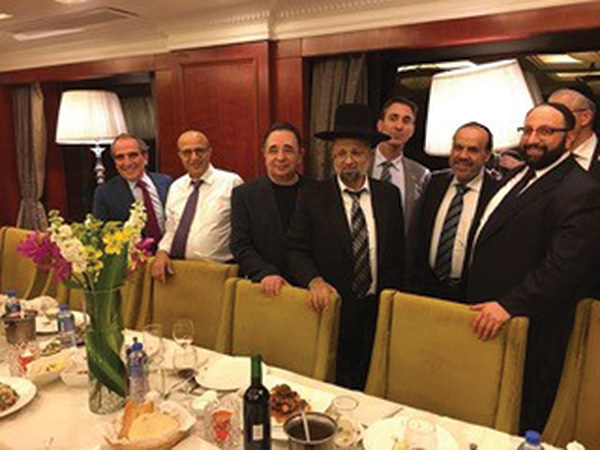
Joseph Sutton, third generation in his family to travel to the Far East, and the grandson of Joseph M. Sutton, tells a story that brings to light the necessity, warmth and atmosphere of Kehilat Zion of Kowloon. “In August 2018, my flight home to Deal from Hong Kong was on a Friday morning but would arrive in plenty of time for a summer Shabbat. After boarding the flight, I fell asleep. Two and a half hours later, I woke up to see we were still on the ground. Concerned I wouldn’t make it in time for Shabbat, I quickly called Rabbi Meoded and explained the situation. He gave me very specific instructions on praying, when to stop doing Melachot and when I could start again based on crossing the International date line. Every question was answered on the spot. Unfortunately, there were two more delays and I got off the plane with a few other businessmen and returned to the hotel.”
Joseph continued, “I was by myself in Hong Kong on Shabbat with no family, on a day that is supposed to be about family. I went to the shul feeling down and sad, thinking about my wife and children back at home. Right when I walked in, the Rabbi’s smile greeted me and instantly, I knew I was at home. The familiar faces, the tunes we sing on Friday night, the Syrian food and the camaraderie of all the people together made me feel at home even though I was 12,000 miles away. That’s Kehilat Zion/Hechal Ezra and Rabbi Meoded—a home away from home.”
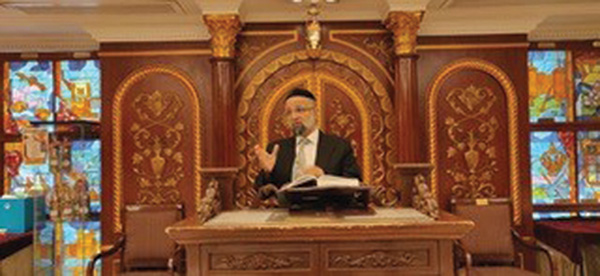
A new committee was formed to connect to the next generation of visitors and travelers. Albert Arazi, Abie Dayan, David Sutton, Joseph Sutton and Israel Sasson are working to help us reach out and connect to younger visitors.
“Due to the cessation of flights, there are no visitors to Hong Kong and therefore most of the businessmen who used to visit from all over the world cannot come. This has caused a difficult blow to the Kehila’s income,” said Rabbi Meoded. “This new reality makes us cope alone with the very high costs of renting the premises with the ongoing expenses, especially in a city like Hong Kong which is one of the most expensive places in the world. The Trade War caused a lack of certainty in trade that takes place between Hong Kong and the whole world, but we hope that, with G-d’s help, everything will return to how it was, and trade will be more stable here, in the US and all over the world. We, as Jews who live here, benefit from the governments in Hong Kong and China. Their attitude towards us is very good,” said Rabbi Meoded. “Thank G-d China (and Hong Kong) is one of the few places in the world without anti-Semitism.”
After moving to Hong Kong, he and his wife Yael were blessed with three children. His dream to go out in the world was from Hashem.
Albert (Bero) Chehebar said, “My father would be ecstatic if he knew this synagogue’s Torah Center in Hong Kong carried his name. All his life he loved rabbis and supported religious institutions. That was his whole life and there was nothing he enjoyed doing more.”
“This is a landmark for the community,” said Saul H. Tawil, one of the Orient Originals. “When we traveled in the 70’s and 80’s, we always wished to have a shul. You can’t imagine the feeling after working all week in China and feeling lonely, it’s so good to walk into the shul on Friday night to the familiar faces with smiles and warm greetings. We need to secure this place for today and future generations.”
As Joey Habert said, “Thank you Rabbi Meoded for making this a true home away from home.”
A journalist and historian, Sarina Roffé is the author of Branching Out from Sepharad, Backyard Kitchen: The Main Course, Backyard Kitchen: Mediterranean Salads, and the cooking app, Sarina’s Sephardic Cuisine. Editor of Dorot, Sarina holds a BA in Journalism, and MA in Jewish Studies and an MBA. She is President of the Sephardic Heritage Project, Co-Chair of the Brooklyn Jewish Historical Initiative and Chair of the Sephardic Research Division of JewishGen.
SARINA ROFFÉ

